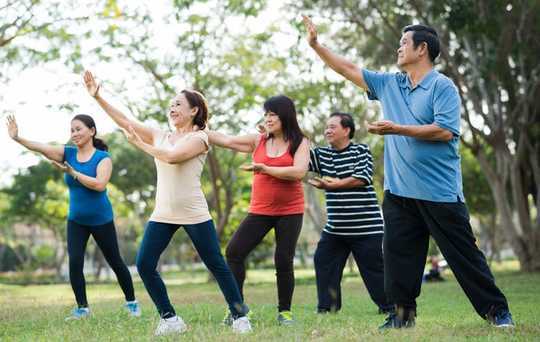Tai chi is growing in popularity in the UK, with more clubs and classes popping up around the country and people of all ages wanting to give it a go.
It has been practised for years in China – often by big groups in parks. Tai chi or “taiji” is a form of qi gong, an umbrella term for ancient Chinese traditional practices of self-cultivation and energy preservation. Tai chi is a “mind-body exercise”. You do slow, gentle, and fluid movements with your body. While doing this you focus on the movements and your breathing and forget about the stresses of life.
Anyone can do tai chi. It is suitable and safe for people of all ages and abilities – though may need to be adapted for certain people or if you have a medical condition.
 Tai chi can be done by people of all ages. Ulza/Shutterstock
Tai chi can be done by people of all ages. Ulza/Shutterstock
Get The Latest By Email
Tai Chi research
A lot of claims have been made about the benefits of tai chi.
Studies have found, for example, that tai chi improves balance and prevents falls, a key issue for older people as falls can result in hip fracture and a fear of going outside independently.
Research has also suggested that tai chi may be good for reducing pain, for example in people with rheumatoid arthritis. And that it may also help to prevent cardiovascular disease, be effective in coronary disease rehabilitation, and help ease breathing difficulties in people with a long-term lung problem.
In addition, it has been suggested that tai chi can improve mental health by reducing symptoms of depression and anxiety and enhancing general stress management. Research has also suggested it could help to improve how well you feel physically and mentally.
Despite these reported benefits, however, a lot of the above research on tai chi has been of poor quality, with unclear or a high risk of bias in results because of the way the studies were carried out – for example, not making sure people are randomly assigned to a tai chi or control group. This is important, as there needs to be no difference between people in the two groups other than doing tai chi or not. Without such controls, it is hard for researchers to draw accurate conclusions. So while current studies suggest it is possible that tai chi offers health benefits, more evidence is needed to truly say if this is the case.
Tai chi and dementia
Tai chi has also been touted as a possible method for helping to prevent dementia or for slowing down the progression of the disease. Studies, for example, have shown that it can enhance cognitive functioning, such as better performance on tests for speed to understand and respond to information, attention, and memory for current tasks.
And tai chi is also considered to have the potential to delay the deterioration in cognitive functioning associated with dementia. Indeed, a study from 2015 found that people who did aerobic exercise or a mind-body exercise like tai chi were less likely to have dementia six years later.
I recently led a team to study the benefits of tai chi for people with dementia. The people in our study were able to learn tai chi and enjoyed the sessions – research shows that finding a form of physical activity that you enjoy increases the likelihood of you starting and maintaining a physically active lifestyle. We also found that tai chi had strong potential to reduce falls and sustain a good quality of life in older people with dementia.
We avoided the risks of bias in earlier studies by conducting a gold-standard study (a randomised controlled trial). Though it was a small study to determine if it’s worthwhile to invest in a larger more expensive randomised controlled trial. So we hope to conduct another study in the future to confirm our results in a larger study.
Though, as yet, the evidence does not strongly support one particular idea for why tai chi may improve brain health and only a few studies have been done with people who have dementia, there are several theories as to why tai chi may improve brain health. For example, tai chi involves learning and remembering new movements. It requires sustained attention and multitasking. Its relaxing aspect is like mindfulness or “moving meditation”. The aerobic exercise aspect could also enhance the efficiency and flexibility of neural connections in the brain. But it is not yet known if tai chi is better for improving these aspects over other types of exercise and mindful activities.
What is clear though, is that tai chi is to be encouraged, as it is safe, easy to learn, enjoyable and has a lot of potential to bring holistic health benefits. What’s needed now is more high quality research that will allow firm conclusions to be drawn as to how much it improves our overall health.![]()
About The Author
Samuel Nyman, Interim Deputy Head of Research, Department of Medical Science and Public Health, Bournemouth University
This article is republished from The Conversation under a Creative Commons license. Read the original article.
books_fitness








